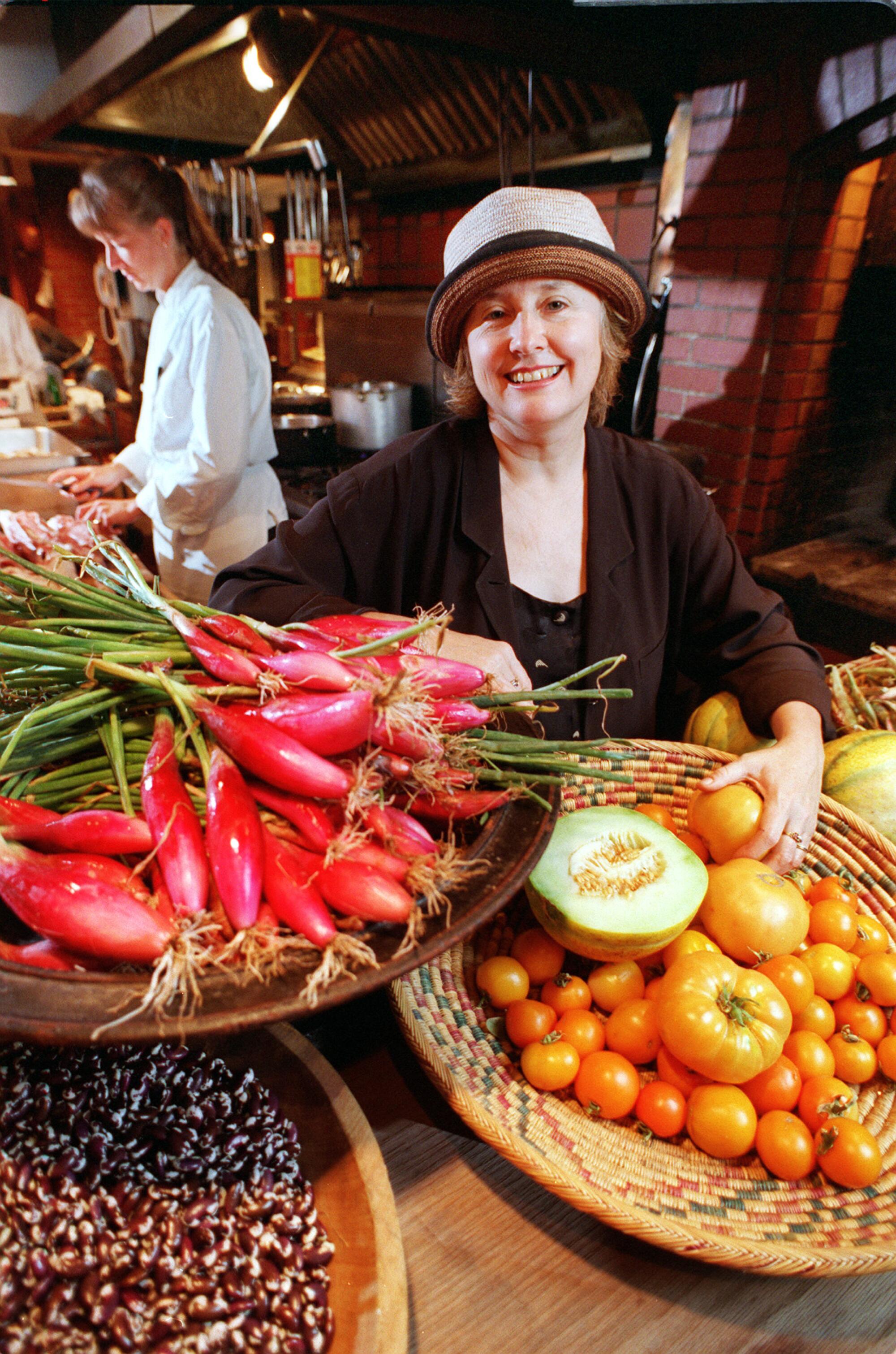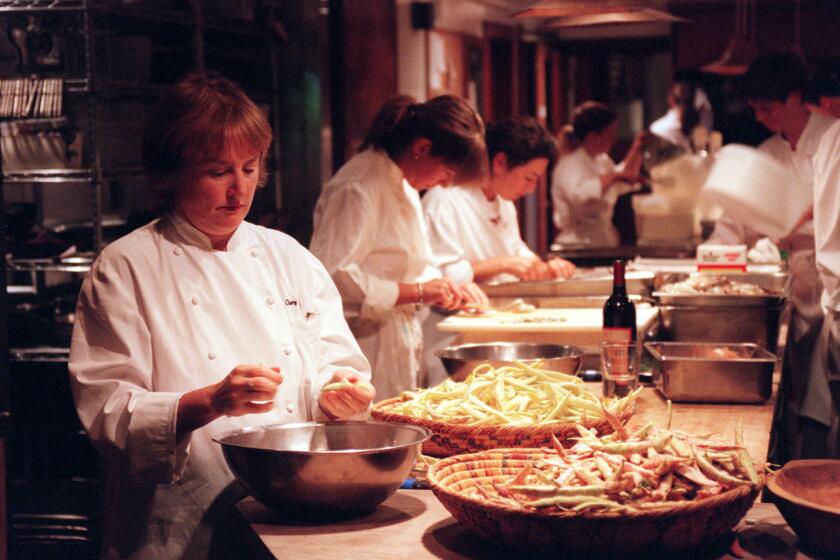Chez Panisse founder Alice Waters is preaching her fresh-foods gospel to schools, policymakers and the president. But are consumers ready to be converted?
- Share via

Writer Orville Schell once called Berkeley’s Chez Panisse the epicenter of a cultural and gastronomic earthquake.
Driven by the force of its founder, Alice Waters, the restaurant set off rumblings that have led to, among other things, gourmet pizza, grilled everything, a taste for hard-crusted rustic bread, the explosion of farmers markets and the appearance of salad-in-a-bag at your favorite supermarket.
Now, as she prepares to celebrate Chez Panisse’s 25th birthday next week, Waters wants to shake things up again. And this time she is using her clout — as the mother of California Cuisine and one of the guiding inspirations behind the more recent New American Cuisine — to take some of her concerns straight to President Clinton.
“We’ve just gotten into such dishonesty about food,” Waters said recently, sitting under the Arts and Crafts-style timbers of Chez Panisse’s downstairs dining room. “Consumerism is so powerful that it doesn’t matter to most of us whether we’re buying food that may be bad for us. We’re paying for fancy wrappers.”
More and more, the 52-year-old restaurateur and author of half a dozen cookbooks is stepping outside the kitchen and overcoming her natural shyness to prod the heads of major food companies, airline executives in charge of in-flight meals and government policymakers into changing the way they think about food.
American cuisine hasn’t been the same since Chez Panisse opened on August 28, 1971.
Waters’ philosophy: Buy food fresh, buy it locally grown, buy organic whenever possible and always buy in season. She exhorted fellow chefs to simplify their cooking to show off their ingredients and to demand pesticide-free products, grown and raised as close to their stoves as possible. She wants the rest of the food industry to do the same.
Don’t hold your breath, say most experts, who cite consumer tastes, logistics and cost as barriers.
Nonetheless, she is determined to do what she can. This month, she established the Chez Panisse Foundation to support programs that promote sustainable agriculture--growing food in a way that preserves resources for the next generation. She was prominent in the group of chefs involved in public forums that helped devise new U.S. Department of Agriculture guidelines for a more nutrition-minded school lunch program, which takes effect this fall.
As a consultant to American Airlines, she persuaded the company to try organic carrots and she hopes to see more organic food used in in-flight meals.
Waters also is a leading member of Chefs Collaborative: 2000, which is dedicated to using affordable, environmentally sustainable farming, fishing and animal husbandry.
She was instrumental in starting what she calls the Edible Schoolyard at Martin Luther King Jr. Middle School in Berkeley. The plan is for children to help grow what eventually will be served in a refurbished cafeteria; now, lunch comes from a snackbar that includes food from Taco Bell.

Alice Waters, founder of the Edible Schoolyard Project and Chez Panisse Restaurant and Café, speaks with Times restaurant critic, Jonathan Gold, at the Los Angeles Times Summit: Big Idea event at UCLA’s Anderson School of Management
Earlier this summer, she participated in a Sacramento conference to help California educators figure out how to get a garden in every public school, a goal of state schools Supt. Delaine Eastin.
“It’s exciting that this one restaurateur in Berkeley has done as much as anyone in California to advance this noble cause,” Eastin said. “She not only wants to teach children how things grow, but to teach them appreciation for taste, something we’ve lost.”
Like a latter-day Johnny Appleseed, Waters wants to see organic gardens in every backyard, in every schoolyard, in every empty lot, and even on the grounds of the White House. She would like to see the government encourage World War II-style victory gardens. The enemies, as she outlined in her 1982 “The Chez Panisse Menu Cookbook,” include frozen and hygienically sealed foods; depersonalized, assembly line fast food; the mass-produced, and the phony.
Waters’ political convictions are long-held--she was active in the Free Speech movement during the 1960s. But her activism on food issues outside the restaurant began with the birth of her daughter.
“When Fanny was born, I had some time away,” said Waters, who didn’t welcome children in her restaurant until she became a mother 13 years ago. “I started thinking about the things that she would be exposed to and I didn’t like what I was seeing.”
At first, Waters did what many new mothers do for their kids--she fed Fanny the best food she could find. Unlike most mothers, however, Waters had access to the country’s finest produce. Still, she wondered what would happen when Fanny was not in the protective world of Chez Panisse. She decided to push for changes.
Waters has been unrelenting in her quest to recruit the First Palate to her cause. Three years ago, the trade journal Restaurants & Institutions asked Waters to name the one world figure for whom she would like to cook. She chose President Clinton.
“I’d like to give him a taste of something he wouldn’t forget,” she told the magazine. “The one-peach dinner. Nothing else. The peach would be of such beauty and deliciousness that no one could fail to remark, ‘Ah, yes.’ ”
Through this peach, Waters, who since has cooked twice for Clinton (once she served him pizza; three weeks ago, salmon), hoped to make the president see food as a vehicle for building community and strengthening families.
In a letter she wrote late last year to Clinton and Vice President Al Gore, Waters said: “Wholesome, honest food must be the entitlement of all Americans, not just the rich, and its availability should be a public goal.”
An earlier letter to the president, just before his inauguration, attracted attention not so much from the White House but from the national media. Waters received some of the first negative press of her career.
It was the so-called “kitchen cabinet” letter, endorsed by several of the nation’s most prominent chefs and intended to get Clinton to choose a White House chef who would set an example for the nation by using organic, local ingredients and by serving food that reflects American cooking.
The letter was widely interpreted as a call for an American to replace then-chef Pierre Chambrin. And when Paris-born Chambrin told reporters that he often used American products, that he had no objection to organic produce if the flavor was right and that, furthermore, he was American (he became a citizen in 1977), Waters appeared to be meddling. Waters herself, it was pointed out, had a Frenchman heading her kitchen.
And when Waters told the Washington Post, “Just seeing what Clinton eats is pretty distressing. McDonald’s and Cokes. It’s a terrible image,” defenders of the common man were outraged.
“Oh those wacky chefs! Always in a stew about something,” wrote one commentator, who imagined a meal of sprouts, organic turnips and tofu as the sort of thing Waters had in mind.
Why, wondered another columnist, couldn’t the “food police,” as she described Waters and her colleagues, let Clinton eat his Big Macs in peace? “He ought to be able to tear into a burger without having Alice Waters tear into him. It’s time for the culinary busybodies to get out of his kitchen.”
“I wasn’t asking to have an American chef,” Waters told a trade publication not long after the fuss. “It probably wouldn’t have received such promotion around the country if it had been correctly interpreted.” She still cringes at the notion of Clinton at McDonald’s, however.
But Waters is not the rigid-minded food cop imagined by some. In person, and without the hat she wears in almost every posed photo, her face is softer, prettier than in her pictures. She smiles easily.
And anyone who has ever eaten at Chez Panisse can attest that sprouts and tofu are the last things you would ever see on the menu.
Neither is Waters a vegetarian. “For the planet’s sake, we probably all should be vegetarians,” Waters says, tossing a shelled bean in a bowl, “or at least we should eat rabbit--I do like rabbit.”
Recently, she and some of her fellow chefs have focused media attention on the U.S. Department of Agriculture’s revamped school lunch program, designed to bring schools across the country into compliance with the Dietary Guidelines of America by lowering sodium and fat consumed by kids and increasing intake of grains, fruits and vegetables.
Ellen Haas, USDA undersecretary for food, nutrition and consumer services, calls the new guidelines “the most historic changes in the program since 1946,” the year of its inception.
In addition to joining in public debates during the formation of the guidelines, the chefs--including Mary Sue Milliken and Susan Feniger of Border Grill in Santa Monica--helped create recipes for food service workers and for a cookbook to commemorate the 50th anniversary of the federal school lunch program.
Waters took the commitment a step further and got involved with the public school closest to her restaurant. Already, a new garden has been planted, local chefs have donated their time and food to some of the classes, and neighborhood volunteers have agreed to keep up the Edible Schoolyard during weekends and vacations.
“We have to change the way we’re educating our children,” Waters said. “We have to teach them at a very young age how to take care of the land, how to feed themselves and how to have pleasure at the table.”
Waters also sparked USDA interest in the Garden Project begun at the San Francisco County Jail, in which inmates and former inmates, as well as some of the city’s homeless, learn to grow food for themselves. Some of the food is sold to restaurants, including Chez Panisse. After Waters got Haas to visit one of the sites, funds were set aside to study the program as a model for other cities.
Eastin sees the project as a model for schools throughout the state. “This really is one person making a change for 5 million children,” she said, “partly from her love of food, but also from her love for children.”
But not everyone appreciates Waters’ help. Haas and the USDA were criticized by Republican lawmakers for wasting food stamp money to promote the Garden Project. And during the hashing out of details of the USDA school lunch plan, Waters was an easy target for interests hoping to preserve the status quo.
“The bottom line is that schools know best what children should eat,” said Rep. Bill Goodling (R--Pa.). “Alice Waters . . . seems hardly the type to advise problem-ridden school feeding operations,” wrote a commentator in the San Francisco Chronicle. “What’s needed is for the federal food Nazis to get real and for the restaurateurs . . . to realize that culinary magic, a la Chez Panisse . . . can’t turn the basics that schools work with--say, frozen beef patties--into haute cafeteria cuisine that kids are willing to eat.”
“To suggest that it is irrelevant to try to feed our schoolchildren with an aesthetic and imaginative lunch program is to suggest that they don’t deserve any better,” Waters responded in a letter to the editor. “It is rooted in the belief that food is merely ‘fuel.’ ”
“Why shouldn’t the bounty of America be available to all American schools, whether poor or rich?” asks undersecretary Haas. “The criticism is politically contrived. Alice’s voice was an important part of our public hearings. She wasn’t just someone who spoke, she volunteered a significant amount of her time.”
As for the Garden Project, Haas says critics didn’t get the whole story. “No money was given to the Garden Project,” she says. “No money was given to Alice Waters. It’s a marvelous project that takes people from dependency and irresponsibility to responsibility. To me, it’s what welfare reform objectives are all about.”
Haas makes the point that getting chefs involved in public policy is not like asking movie stars to comment on the issues of the day. “Chefs know how to run a business. They know how to market food, and we need to learn from them. Children aren’t just going to decide on their own, ‘Oh, I want to eat a zucchini.’ And we can’t be preaching to them. The kids are only going to eat the food if it tastes good.”
At Chez Panisse, Waters tends to practice what she preaches. Scraps from the kitchen, collected in a compost bin, are bartered to a local farmer for vegetables. Around the side of the building is an elaborate system of plastic garbage bins into which trash is methodically sorted for recycling. This has to be the only restaurant in America without a single smelly dumpster.
On staff is Alan Tangren, forager, who keeps track of the more than 75 small farmers, ranchers and other suppliers who keep Chez Panisse stocked with the ingredients that make the restaurant famous. This summer, Tangren’s job was made more difficult when Waters decided to commit the restaurant at long last to buying only organic produce. Most Chez Panisse sources are organic, but there are tricky things, like decent organic potatoes, that are hard to find. So far, the organic tubers they’ve tried don’t fry right.
Meanwhile, Waters is looking forward to the fall semester at the Edible Schoolyard, which got off to a slow but encouraging start.
“I did have have a shock on Day One,” Waters says. “I wanted to have something nice for the kids to eat so after they ate their burritos I gave them some Frog Hollow peaches. I always think peaches will seduce anybody, but they didn’t like the furry skin. They had never had a real peach.”
By the end of the program, however, the kids were eating--and loving--organic grapes and strawberries. Waters didn’t try the peaches again.
But she did finally get her peach moment with President Clinton when she and some of her staff cooked dinner for a fund-raiser at Esprit founder Susie Tompkins’ San Francisco penthouse a few weeks ago. On the menu for dessert: a baked peach with wild blackberries. Unfortunately, Clinton, who was appearing at three dinners that night, ate only the main course.
Waters sent a peach to him anyway. She heard he ate it in the elevator on his way out.
* COOKING THE WATERS WAY: American cuisine hasn’t been the same since Chez Panisse opened 25 years ago. H1
More to Read
Eat your way across L.A.
Get our weekly Tasting Notes newsletter for reviews, news and more.
You may occasionally receive promotional content from the Los Angeles Times.












